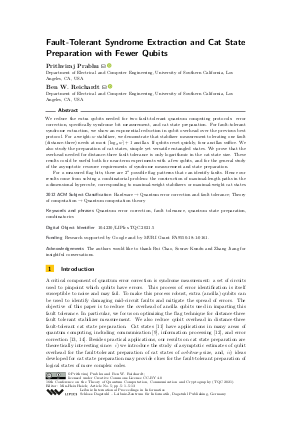@InProceedings{prabhu_et_al:LIPIcs.TQC.2021.5,
author = {Prabhu, Prithviraj and Reichardt, Ben W.},
title = {{Fault-Tolerant Syndrome Extraction and Cat State Preparation with Fewer Qubits}},
booktitle = {16th Conference on the Theory of Quantum Computation, Communication and Cryptography (TQC 2021)},
pages = {5:1--5:13},
series = {Leibniz International Proceedings in Informatics (LIPIcs)},
ISBN = {978-3-95977-198-6},
ISSN = {1868-8969},
year = {2021},
volume = {197},
editor = {Hsieh, Min-Hsiu},
publisher = {Schloss Dagstuhl -- Leibniz-Zentrum f{\"u}r Informatik},
address = {Dagstuhl, Germany},
URL = {https://drops.dagstuhl.de/entities/document/10.4230/LIPIcs.TQC.2021.5},
URN = {urn:nbn:de:0030-drops-140001},
doi = {10.4230/LIPIcs.TQC.2021.5},
annote = {Keywords: Quantum error correction, fault tolerance, quantum state preparation, combinatorics}
}

 Creative Commons Attribution 4.0 International license
Creative Commons Attribution 4.0 International license

